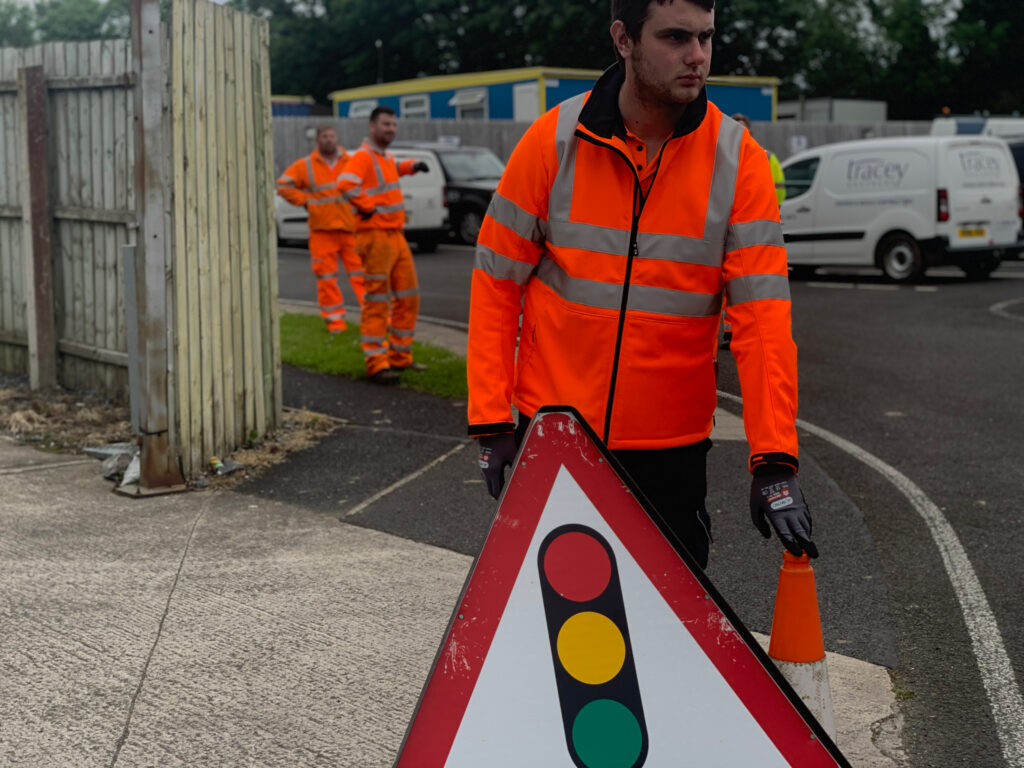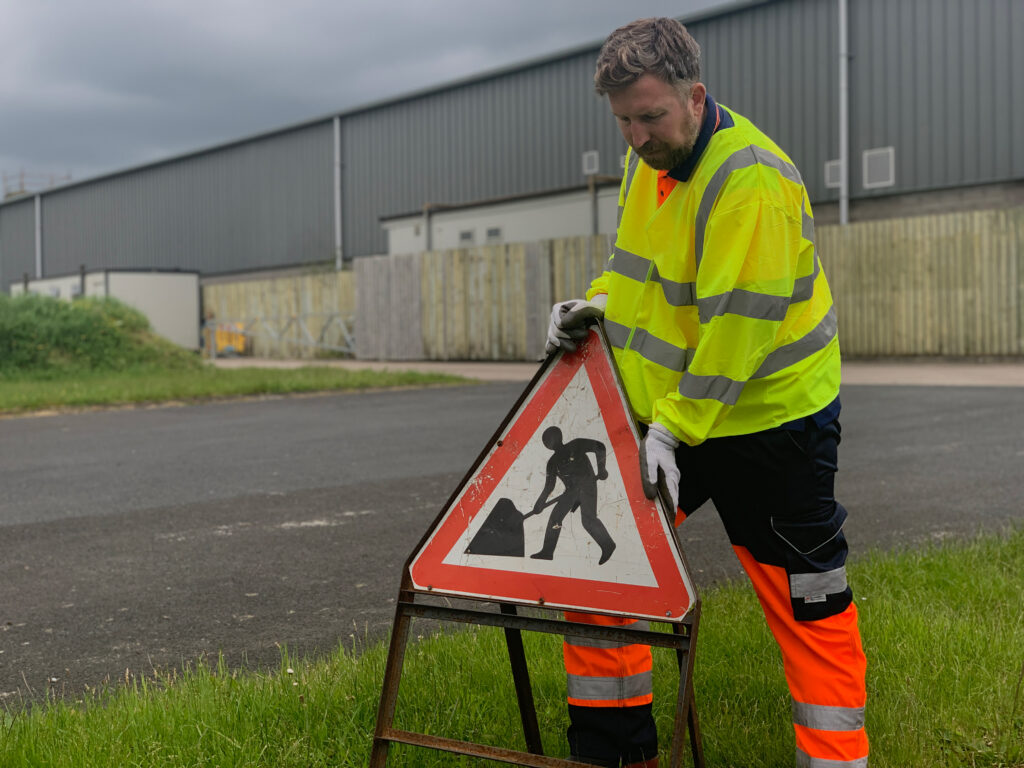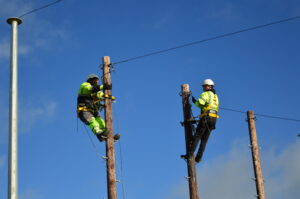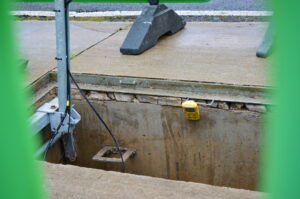Traffic management (also known as road traffic control) refers to the act of directing vehicles and pedestrians around some form of disruption.
It’s a combination of measures and processes implemented to prioritise the safety of all road users (inclusive of cyclists, motorbike users and pedestrians) and ensure they move safely and efficiently on road networks through the introduction and control of speed limits, waiting restrictions, traffic signing and road markings.
Creating safer and smoother
driving conditions
Conventional traffic management measurements lead to smoother driving conditions, reduced congestion, and few accidents.
Examples of traffic management provisions include:
- Lane and road closures
- Speed control and speed limits
- Implementation of traffic light systems
- Signing, lighting and guarding details
- Site maintenance and legal issues associated with them
- Works on roundabouts
- Works on road junctions

When is Traffic Management required?
It is required when works are being implemented on rural and urban roadways, construction sites, during road resurfacing, local authority works such as tree removal as well as management of traffic flow at events. Management of traffic may also be required during accident and emergency situations and any other settings where disruption may be caused to traffic or pedestrians.
To ensure that appropriate health and safety measures and equipment are implemented and used, traffic management requires Sector Scheme training of personnel. Such training will ensure that the design and installation, maintenance and removal of traffic control plans are done according to local authority requirements and meet required national highway Sector Schemes and comply with health and safety requirements.
Depending on the level of training, traffic management responsibilities can include:
- The development and monitoring of planned traffic routes
- Development of risk assessments and method statements
- On site assessments
- Installation and commissioning of traffic management systems
- Removal of traffic management schemes
Without traffic management systems, roads and motorways would be hazardous for those carrying out repair works, drainage, maintenance or other construction or utility works and events.
These systems are usually designed and implemented when traffic control systems have reached maximum capacity and further measures are required to manage road networks. The rules and requirements can vary depending on specific conditions of the site, e.g., situations where mobile plant and machinery is in operation or excavations taking place will require ground and / or overhead space and therefore traffic management schemes must be designed in accordance with associated risk assessments.

Traffic Management Personnel
& Sector Scheme 12D Training
Traffic management personnel have a fundamental duty to support road workers by implementing temporary traffic management to ensure traffic safety. Sector Schemes have been developed to ensure that traffic management personnel are trained to industry standards that are recognised across the UK.
Persons commencing work for the first time in Temporary traffic Management and who do not hold any current NHSS 12ABCD registration cards, must undertake the NHSS 12D M1 Course.
Lantra Traffic Management Sector Scheme 12D Training
At ITS, we offer LANTRA Sector Scheme 12D Traffic Management training across a range of levels including Operative and Supervisory and Management level. LANTRA training has been developed in line with quality assurance requirements and covers all occupational competencies required to implement temporary traffic management while adhering to industry and national standards.
The full list of LANTRA sector scheme 12D TM training includes:
NHSS12D T7 Training M7 Assessment
Supervisory, Management, Designers, Client Officers, Technicians, and any person who does not actually install TTM but requires knowledge of the basic practice. It is a mandatory requirement for Technical Officers and the organisation’s TTM Manager – see the National Highway Sector Scheme 12D Document requirements.
Temporary Traffic Management Basic Course (TTMBC)
For all persons starting work for the first time in the temporary traffic industry, and for those persons that do not hold any current NHSS12A/B/C/D registration cards or certificates.
NHSS12D T1, T2 Training M1, M2 Assessment
All persons working on single carriageways needing to become a Registered Traffic Operative (RTMO) for Mobile or Statics works as described in the Sector Scheme Document 12D.
NHSS12D T3 Training, M3 Assessment
All Registered Operatives (RTMO) as described in National Highway Sector Scheme (NHSS) Document 12D who wish to add this category for static works low speed dual carriageway to their NHSS12D card.
EUSR – Understanding Safety in Excavations
This theoretical safety course introduces the learner to the basics of working around excavations. Designed as an awareness course, particular emphasis is provided to key aspects of managing and/or overseeing excavation work.
NHSS12D T5 Training, T5 Assessment
National Highways Sector Scheme (NHSS) 12D M5 is for all Registered Traffic Operatives (RTMO) as described in Sector Scheme Document 12D who wish to add 12D T5 Multi phase traffic lights to their card
NHSS12D T6 Training, T6 Assessment
For all Registered Traffic Operatives (RTMO) as described in the National Highway Sector Scheme (NHSS) 12D Document who wish to become a Registered Lead Traffic Management Operative (RLTMO).
On completion, learners will be deemed competent to oversee NHSS12D M1/M2 work situations and other works situations where they have achieved competency (i.e., M3 to M5).
For further advice or details of LANTRA training dates in 2023, please contact us on 028 3839 8700 or email [email protected].




